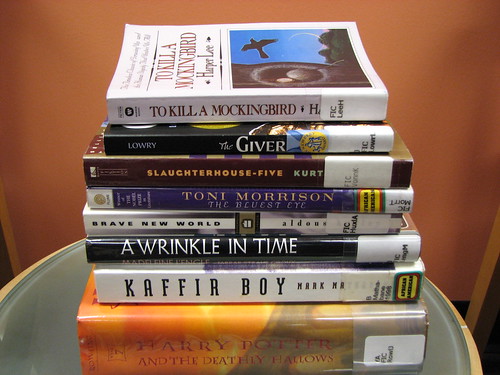Banned Books Week
/
Today marks the start of Banned Book Week, a campaign to bring about awareness of works of literature that have been suppressed or authors who have been persecuted for their works. According to the American Library Association, the week celebrates the importance of the First Amendment, while "drawing attention to the harms of censorship by spotlighting actual or attempted bannings of books across the United States." Coming from a family that does a lot of reading, and from working within a couple of libraries, I detest the notion of banning a book for its content, especially in school systems, and I am continually worried when I hear of various books being banned by overprotective parents, school boards of bigoted, ignorant people who misunderstand the reasons behind education.
The ALA published a list of frequently challenged books from across the country. Looking down the list, I see a number of books that I read in high school, and on my own, that I both greatly enjoyed and/or read on my own: The Great Gatsby by F. Scott Fitzgerald, Of Mice and Men and The Grapes of Wrath by John Steinbeck, The Lord of the Flies by William Golding, Animal Farm and 1984 by George Orwell (the irony of this book being banned is almost comical), Their Eyes were Watching God by Zora Neale Hurston, For Whom the Bell Tolls by Ernest Hemingway, The Call of the Wild by Jack London and The Lord of the Rings by J.R.R. Tolkien. I know other books, such as Philip Pullman's His Dark Materials Trilogy and J.K. Rowling's Harry Potter series have also been burned or have been pushed to be banned, and I'm reasonably sure that numerous other science fiction, fantasy and other speculative fictions have been banned because of their content.
Education, I believe, is not strictly about the content that students are fed, but a way to understand the world around them. In subjects such as English, this is a paramount lesson to be learned, as books and stories pull specific themes and instances out for characters, and allows students to synthesize problems and see how characters are changed based on their experiences within the story. Within any story, conflict that challenges the characters should likewise challenge the readers, by looking at commonly held assumptions and continually questioning how they go about the world. This is where the greatest learning occurs for anyone.
The outrage here is that limiting the books that students can read traps them within a preset outlook on the world, where books that fall outside of the realm of political correctness, are 'indecent' or overly challenge assumptions are unable to do what they are intended to do. What bothers me even more is that a number of the locations where books are banned within the US come from traditionally right-wing regions of the country, regions where people claim to want to uphold the constitution, to ensure that freedoms aren't limited by their government, while turning around and insisting that they do the very same thing within their communities. The hypocrisy of the situation is stunning, and I can't help but wonder if our insistence on protecting our youth from things that we disagree with is hurting the country as a whole.
The argument against banning books is something that’s been out there for a long time, and there’s very little beyond my own experience and resulting conclusions that I can add to the situation. Looking over my own high school English experience (with some fantastic teachers in the humanities) I am shocked at how many of the books that I read are amongst the most banned list, and for fairly trivial reasons, such as language and content. Moreover, reading some of those books are incredibly valuable experiences for me. Some of the books, such as Of Mice and Men, The Lord of the Flies and For Whom The Bell Tolls, were ones that imparted a number of revelations and provided specific learning experiences that I was then able to build upon. These books are not easy to replace, and students do not read these simply for pleasure: the challenge is the object here.
Nor do I believe that reasons such as language and ‘obscene’ situations hold much water in this day and age, when students have access to the wider internet, where whatever is banned is conceivably right at their fingertips, where there is no guidance or supervision. Instead, parents should take the moral reins and instruction for their children, and teach them right from wrong.
Banning books isn’t the answer, or a good thing for any sort of quality education. Actually educating, challenging and extracting a reaction from students will bring about the proper understanding from students.
